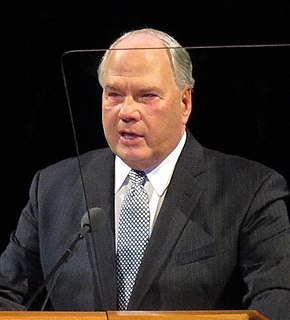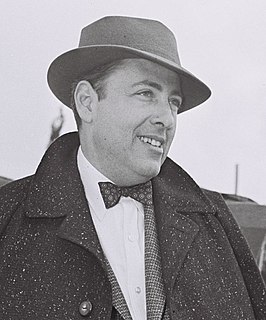A Quote by Francois de La Rochefoucauld
Folly pursues us at all periods of our lives. If someone seems wise it is only because his follies are proportionate to his age and fortune.
Related Quotes
But we are pledged to set the world free. Our toil must be in silence, and our efforts all in secret. For in this enlightened age, when men believe not even what they see, the doubting of wise men would be his greatest strength. It would be at once his sheath and his armor, and his weapons to destroy us, his enemies, who are willing to peril even our own souls for the safety of one we love. For the good of mankind, and for the honor and glory of God.
“When ye are in the service of your fellow beings ye are only in the service of your God.” Focusing on serving our brothers and sisters can guide us to make divine decisions in our daily lives and prepares us to value and love what the Lord loves. In so doing, we witness by our very lives that we are His disciples. When we are engaged in His work, we feel His Spirit with us. We grow in testimony, faith, trust, and love.
This fellow is wise enough to play the fool; And to do that well craves a kind of wit: He must observe their mood on whom he jests, The quality of persons, and the time, And, like the haggard, check at every feather That comes before his eye. This is a practise As full of labour as a wise man's art For folly that he wisely shows is fit; But wise men, folly-fall'n, quite taint their wit.
We are many small puppets moved by fate and fortune through strings unseen by us; therefore, if it is so as I think, one has to prepare oneself with a good heart and indifference to accept things coming towards us, because they cannot be avoided, and to oppose them requires a violence that tears our souls too deeply, and it seems that both fortune and men are always busy in affairs for our dislike because the former is blind and the latter only think of their interest.
How can we feel our need of His help, or our dependence on Him, or our debt to Him, or the nature of His gift to us, unless we know ourselves.... This is why many in this age (and in every age) become infidels, heretics, schismatics, disloyal despisers of the Church.... They have never had experience of His power and love, because they have never known their own weakness and need.
Uriah looked better than he did an hour ago--he washed the blood from his mouth, and some of the color returned to his face. I'm struck, suddenly, by how handsome he is-- all his features are proportionate, his eyes dark and lively, his skin bronze-brown. And he has probably always been handsome. Only boys who have been handsome from a young age have that arrogance in their smile. Not like Tobias, who is almost shy when he smiles like he is surprised you bothered to look at him from the first place.
We are here on this earth to know God intimately, fully, correctly, and contagiously; to house His holy person in our very bodies, allowing Him to showcase to the world around us His loving nature, His attitude, His thoughts, His emotions, and His actions through the way we live every moment of our lives.
Let us fill a cup and drink to that most noble, ridiculous, laughable, sublime figure in our lives... The Young Man Who Was. Let us drink to his dreams, for they were rainbow-colored; to his appetites, for they were strong; to his blunders, for they were huge; to his pains for they were sharp; to his time for it was brief; and to his end, for it was to become one of us.
The master in the art of living makes little distinction between his work and his play, his labor and his leisure, his mind and his body, his information and his recreation, his love and his religion. He hardly knows which is which. He simply pursues his vision of excellence at whatever he does, leaving others to decide whether he is working or playing. To him he's always doing both.
Ah! but the moods lie in his nature, my boy, just as much as his reflections did, and more. A man can never do anything at variance with his own nature. He carries within him the germ of his most exceptional action; and if we wise people make eminent fools of ourselves on any particular occasion, we must endure the legitimate conclusion that we carry a few grains of folly to our ounce of wisdom.
Whoever is wise is apt to suspect and be diffident of himself, and upon that account is willing to "hearken unto counsel"; whereas the foolish man, being in proportion to his folly full of himself, and swallowed up in conceit, will seldom take any counsel but his own, and for that very reason, because it is his own.





































